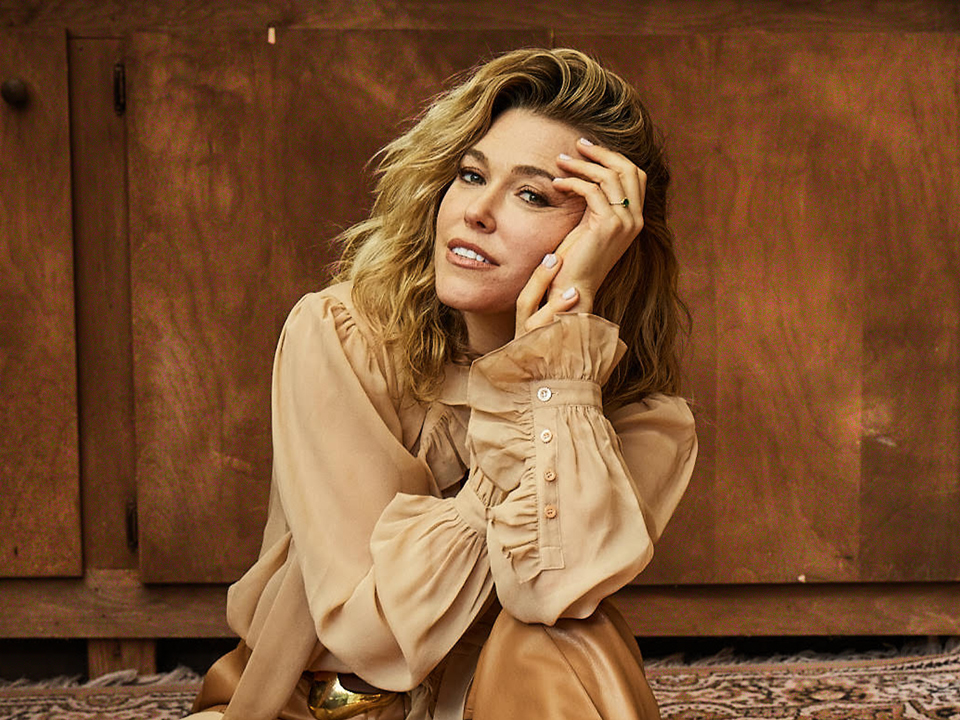Rachel Platten’s Next Anthem Is Here to Heal You
The “Fight Song” singer is about to release another hit.
Over the last 10 years, Rachel Platten’s “Fight Song” has been blasting everywhere from shopping malls to fundraising events. Those familiar “take back my life” lyrics are like a battle cry for anyone who’s been through their own struggle. And while those are some big shoes to fill, Platten is dropping a new anthem for us all on April 26. “I really believe ‘Bad Thoughts’ will be the ‘Fight Song’ for mental health,” she tells Wondermind.
A full-length album will come later this year, but, in the meantime, Platten tells us the new music is rooted in her experiences with postpartum depression and anxiety. “It's kind of like the hero's journey and what happens when you face the darkness and it gets so dark and so overwhelming that you're forced to cry out ‘mercy’ and fall on your knees and surrender,” she explains. “And then, what does it look like to come out the other side [when you gain] light and peace and inner strength?”
Here, Platten shares more about her latest project, the words of encouragement that helped her through postpartum, and the mental health stigma she learned to let go of.
WM: How are you doing lately?
Rachel Platten: For the first time in a couple of years, [my mental health] is really good. I'm really good—grounded and calm and strong and resourced and happy.
WM: What songs or lyrics off this new album were particularly healing for you to create?
RP: A lot of the songs I wrote were medicine for me at the time that I needed it. I went through a period after “Fight Song” of [thinking], What does the world need from me? I'm the empowerment girl. I stand for this thing. Do I need to go make more songs like that? And there was kind of a rejection in my mind. I don't want to only do that. I'm not only this one thing.
The past five years forced me to be so deeply internal, with becoming a mom and having my second child and struggling with postpartum a couple times and battling my own demons. It was no longer What does the world need from my music? but How can my music help me, and what do I need from it? So the songs were often medicine for me in moments of really, really scary, hard things.
“Mercy” was written at a moment of my own crying out to God. … The lyrics were really a journal entry. At the time, it was, “I'm crying mercy on my knees. Help me. I don't have anything left.”
And the song that I'm about to be releasing, “Bad Thoughts,” is also something that I love so much because it walks me and the listener through a meditation the whole time. There's cues during the song [saying], “Breathe in, breathe out.” I've never really heard that in a pop song before. I'm really proud of it because it's combining things that saved me: meditation and breathwork and music. I'm really proud of that and excited to help listeners get cues to breathe and remind them to be present with themselves while listening to a pop song.
WM: How did you get into meditation and learn about the importance of mental health?
RP: Therapy has been a lifesaver for me. I've now been in pretty intense therapy for the past five, six years, and it's been incredible. It's been life-changing for me. You would think that I would've known about that tool because I come from two therapists. My mom is a family therapist, and my dad is a clinical psychologist who then went to industrial-organizational psych. I was raised on stories of Freud at bedtime, and that language is very used in my house. … But even with that basis, I still didn't know to use that tool.
I think I went into more of the esoteric LA scene of trying all these other things, like a lot of eastern methods of Reiki and acupuncture. They're all great, but when I was really struggling and suffering and had a diagnosable mental health breakdown and problem, which was postpartum depression and anxiety, I needed the tool of therapy and then medication to actually build the foundation of the building so that I could use those other tools.
WM: Even with therapist parents, did you have any misconceptions or stigmas around therapy or medication before you actually tried them yourself?
RP: Oh my God, I was so hung up on I don't want to take an SSRI. At one point in my 20s, I tried selective serotonin reuptake inhibitors, and it helped me. That was around the time that I decided to be a musician at 21, 22, and the terror that came along with having no idea what to do or how to start. And I'm now 42, so that was 20 years ago.
When the walls kind of broke down again around the birth of my first child, I was very resistant to that and actually found my way out of the darkness that time through herbs [from my acupuncturist and through other methods, like therapy].
But with my second baby, things got even darker and my hormones were really dysregulated and it was just too much in my body. … I was very resistant and very scared of the stigma of: What does it look like to be on an antidepressant? I don't want to. I want to be able to think my way out of this or pray my way out of this or write music to get out of this.
What my therapist and my family ultimately helped me understand was, look, if you have a broken arm, you don't hesitate to put a cast on. … There are science-backed ways to ameliorate [what’s happening in your brain] so that you can then do the work. I don't believe in taking the antidepressant and then just living your life and not addressing the problems. I believe in doing it so then you can address and actually start to do the real work.
WM: What does your mental health routine typically look like today and when you're having a tough time?
RP: One of the amazing things about having my own little breakdown was that I have learned so many tools that are in my pocket. … I have a lot of tools that involve journaling and writing. I call it “rage on the page” or “journal speak.” As one of my teachers taught me, you just write everything. Write the things you don't want to tell anyone. Write out the worst thing you're thinking. Then, rip it up. Sometimes it's the buried stuff that lodges in our body that can come out as chronic pain, which it did for me, or confusing emotions that you don't know where they're coming from. I get it out.
I also use Internal Family Systems techniques. It's incredible work that has also been life-changing for me, and I will access the capital Self or God or whatever you call it. For me, it's God and also Self, and they're interchangeable. But I'll find a way to access that voice and then, as Mama Rachel, be able to hold all the little Rachels that are having the big humongous feelings. … A lot of my journey has been mothering myself, reparenting myself, and allowing myself to be both the beholder and the held.
WM: I imagine people have lots of advice or opinions when you’re dealing with postpartum struggles. Did anyone say anything to you during that time that was actually helpful for you?
RP: I don't know if it applies to every mom's suffering, but it really helped me as a musician who had a dream of what I wanted to do, which was to put out this next body of work. It got really confusing as I was in that postpartum fog and haze and depression and fear of: Will I ever be anything more than just a mom ever again? Will I ever be anything more than just a cow that someone is sucking on? You really feel like you're losing yourself. It can be really scary. So what did help me so much was the reminder that it was temporary and that it was hormonal and that it was normal and that [so many] women suffer from postpartum and that there was nothing wrong with me.
And someone told me that this is not an obstacle. What you're going through is the way to the freedom and the truth and the light and the creativity that you're looking for. I don't know if that resonates with people as much as it resonated with me, but in that moment, it gave me this seed of hope that I'm not being taken off course by this darkness. This isn't something that's interrupting this beautiful plan that God has for my life. I [haven’t] taken a wrong turn somewhere. It really helped me understand, Well, could this be the path? When we pray for strength, it's not like we're just given strength. We're put through a gigantic test. We have to find our strength. When we ask for patience, we don't just get to be these patient people. We're probably tested by a lot of annoying things to find and develop patience, like a 2-year-old tugging on you or throwing tantrums.
That was what led me to this newfound joy and strength and womanhood and motherhood and being the boss and leading an organization and having the confidence and faith in my own relationship with God. I don't need other people to intercede for me and be the voice. To be able to know my own answers is so incredible now. I couldn't have developed that if not for this battle that I went through where I was wrestling with my demons.
For other women struggling with severe depression, if they were unfortunate like I was, please know that there is hope, that this is temporary, that other women have experienced it.
WM: What message would you like to leave with readers?
RP: If you're suffering, please know that there is help. I know there’s stigma around getting help, but my God, if I could whisper it in your ear and give you a hug and just let you know that help will be so transformational if you are vulnerable enough to take your mask off and admit that something's wrong and you can't do it yourself.
You're not alone. So many of us have struggled over the past couple of years with everything that happened and is happening in the world, and there's nothing wrong with you for not being able to handle it. I don't think our human bodies are meant to handle this much stress or this much awareness on social media of what else is going on in the world. Please allow yourself to be loved on and get the help that you need. There's nothing wrong with you. You're not weird, and I love you, and I'm rooting for you.
This interview has been edited and condensed for length and clarity.
Wondermind does not provide medical advice, diagnosis, or treatment. Any information published on this website or by this brand is not intended as a replacement for medical advice. Always consult a qualified health or mental health professional with any questions or concerns about your mental health.




